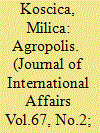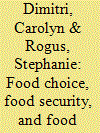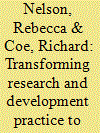|
|
|
Sort Order |
|
|
|
Items / Page
|
|
|
|
|
|
|
| Srl | Item |
| 1 |
ID:
130309


|
|
|
|
|
| Publication |
2014.
|
| Summary/Abstract |
Over fifty percent of the world's population is urbanized-living in cities- and cities almost entirely depend on imported food to meet daily needs. Different factors such as population growth, urbanization and increasing global demand for food are intensifying; urban agriculture is an important tool for enhancing food security in response to the food related restraints faced by city dwellers. Through a historical retrospective of urban agriculture to an analysis of current practices and policies, these article explores urban agriculture's potential ability to manage the lack of land and water in cities through the development of innovate growing techniques that optimize the access, quality, and quality of foods for millions of people in developing cities around the globe.
|
|
|
|
|
|
|
|
|
|
|
|
|
|
|
|
| 2 |
ID:
130300


|
|
|
|
|
| Publication |
2014.
|
| Summary/Abstract |
Genetically engineered (GE) foods apply new molecular technologies to agriculture. Widely adopted in the United States, Brazil and Argentina for the production of cons, soybeans, and cotton, they are practically banned in Europe and tightly regulated throughout the world. We have found that GE foods have significantly increase supplies cons, soybeans, and cotton, and lowered their prices, Thus improving food security, GE foods have already contributed to a reductions in the use of pesticides and emissions of greenhouse gases.
|
|
|
|
|
|
|
|
|
|
|
|
|
|
|
|
| 3 |
ID:
130295


|
|
|
|
|
| Publication |
2014.
|
| Summary/Abstract |
Economics, nutrition, and public health literature includes much research on the factors that influence food choice and attempts to understand the factors contributing to low food security. Economic factors, such as prices and income influence food choice and food security, as do access and availability of food. Yet recent literature indicates that behavioral factors- such as the physical environment and market strategies, including package size and product placement have equal importance.
|
|
|
|
|
|
|
|
|
|
|
|
|
|
|
|
| 4 |
ID:
130296


|
|
|
|
|
| Publication |
2014.
|
| Summary/Abstract |
Recent global policy attention to "land grabs" by international investors while very important, has diverted attention away from two other process that may be even more fundamentally affecting Africa's economic development trajectory: (1') the pace of land acquisitions by medium-scale African investors, who non-' control more land than large scale foreign investors in each of the three countries examine in this study (Ghana Kenya, and Zambia); and (ii) the overall impact of land transections on the viability of African governments' agricultural strategies, which for the most part remain predicated on smallholder led development and will require the expansion of cropland by smallholder household in Zambia and Ghana
|
|
|
|
|
|
|
|
|
|
|
|
|
|
|
|
| 5 |
ID:
130297


|
|
Strategic choices shaping agricultural performance and food sec
/ Haggblade, Steven; Boughton, Duncan; Cho, Khin Mar; Denning, Glenn, Todd, Renate Kloeppinger, Oo, Zaw, Sandar, Tun Min, Than, tin Maung, Wai, Naw Eh Mwee Aye, Wilson, Shannon, Win, Ngu Wah, Wong, Larry C
|

|
|
|
|
| Publication |
2014.
|
| Summary/Abstract |
Despite the many transformations taking place in Myanmar, its agricultural sector is lagging. A high proportion of rural households remain poor and food insecure as s result. This article examines the underlying cause of poor agricultural performance through a combination of literature and secondary data review combined with extensive field.
|
|
|
|
|
|
|
|
|
|
|
|
|
|
|
|
| 6 |
ID:
130303


|
|
|
|
|
| Publication |
2014.
|
| Summary/Abstract |
Millions of smallholder farmers face the daunting challenge of sustaining or improving productivity in the face of rising input costs, limited access to input and output markets, climate vagaries, and depleted natural resources. These farmers' objectives and circumstance are diverse, varying with both their biophysical environments and their socioeconomic and cultural context. Agroecological intensification (AEI), or the integration of agroecological principles into farm and system management can improve the performance of agriculture-"performance" being locally defined and potentially including productivity, nutrition, resilience, and sustainability.
|
|
|
|
|
|
|
|
|
|
|
|
|
|
|
|
| 7 |
ID:
130298


|
|
|
|
|
| Publication |
2014.
|
| Summary/Abstract |
With more than half of the world's population urbanized and two thirds of urbanites in developing countries, populations are moving away from agriculture-based livelihoods. However, people still must eat. This paper provides case study analyses of food security policies and programs in three cities at varying levels of development- Addis Ababa, Bogota and New York city- and examine the food security issues faces by these changing urban populations, and how policies in these cities have addressed these concern. It will explore the efficacy of policies and food security interventions by analyzing government and international community capacities as food production, distribution, and consumption change along with the processes of urbanization in both the developing and developed context.
|
|
|
|
|
|
|
|
|
|
|
|
|
|
|
|
| 8 |
ID:
130255


|
|
|
|
|
| Publication |
2014.
|
| Summary/Abstract |
This paper probes some of the global economic forces that have contributed to the ongoing precarious global food security situation, especially in the years since the 2007 to 2008 food crisis. Since the crisis hit at a time when global food production per capita was rising, it is important that policies addressing hunger incorporate dimensions beyond food production. There has been some acknowledgement of the role of global economic forces in the food crisis by global policymakers, but global food security initiatives still largely emphasize increased food production over other measures. The paper concludes that more needs to be done to ensure that the rules that govern the global economy--especially those regarding international trade, finance, and investment--do not work against the goal of food security.
|
|
|
|
|
|
|
|
|
|
|
|
|
|
|
|
|
|
|
|
|